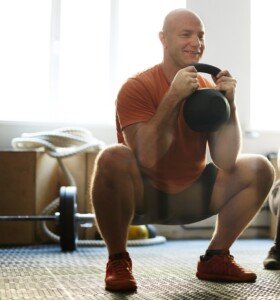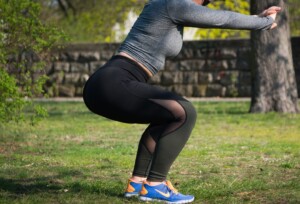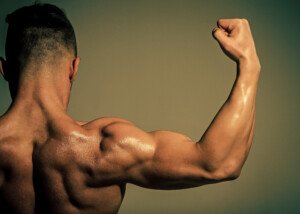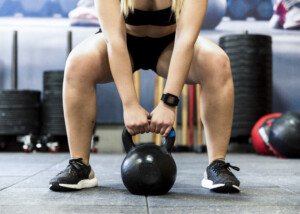Are you annoyed, curious or scared because squatting has caused twitching muscles?
There’s a reason why the motion of squatting can trigger a muscle to twitch.
So what kind of squatting are we talking about? It can vary.
• Squatting in the garden
• Squatting around the house to pick things up
• Squatting at the gym — with a barbell across your back; holding kettlebells at shoulder level; deep repetitive body-weight squats or those with weights.

Shutterstock/Pressmaster
The squatting that most likely will cause muscle twitching is the kind done for exercise, and especially if it’s done intensely.
There is nothing inherent about squatting, vs. other leg exercises, that will more likely cause twitching muscles than other movements such as the leg press, hamstring curl, lunge or leg extension.
Squats engage the glutes, quadriceps and hamstring muscles. These are big, strong muscles that are designed to support a lot of resistance.
• Back squatting a 225 pound barbell
• Deep squatting while holding a 30 pound kettlebell in each hand at shoulder level, then pressing the weights overhead upon rising from the squat—12 repetitions.
• 25 to 50 deep squats while standing on the flat side of a BOSU board.
• Jump squats: squatting to at least parallel, then exploding upward into a jump off the floor, for 12 reps.
• And so many more squat-based movements like lunge jumps, box jumps and weighted walking lunges.

Shutterstock/Undrey
Any kind of intense squatting exercise is excellent for the lower body and core, and is one of the best calorie burners and fitness builders out there.
Along the way there may be some twitching muscles (legs, glutes) right after, or a short time after, the squatting routine.
The twitching may last for a few hours. It may carry over into the next day. This is nothing to worry about.
Why does squatting cause muscle twitching?
• Quite simply, you hammered your muscle fibers.
• They are buzzed and very fatigued.
• The twitching may be caused by a shortage of valuable minerals, especially magnesium.
Magnesium Post-Workout for Twitching Muscles

“Magnesium should be taken daily in divided doses,” says Carolyn Dean, MD, ND – Medical Advisory Board Member, Nutritional Magnesium Association.
“Magnesium is known as the anti-stress mineral and is one of the key electrolytes along with sodium and potassium that needs to be replenished post-workout,” explains Dr. Dean.
“Magnesium relaxes muscles while calcium contracts muscles, so a balance of both of these minerals on a one to one ratio is important for proper muscle function and for recovery.”
Muscles that are tense and not relaxed are more prone to twitching, even if you have not done any recent squatting workouts.
Dr. Dean continues, “Not all forms of magnesium are easily absorbed by the body. Magnesium citrate powder is a highly absorbable form that mixes in water and should be sipped regularly as a post-workout recovery drink.”
It is tasteless and very easy to drink. It adds a very mild fizz to whatever beverage you add it to.
“Magnesium is an anti-inflammatory, so it will help with general pain relief along with heat/cold patches, ice packs, etc.
“When people sweat, they lose sodium and potassium. What most people do not know is that magnesium is also lost through the sweat glands.”
Muscle twitching that’s generated from your squat workout or even a lot of squatting around the house is a temporary, benign phenomenon. It is nothing to worry about!
Heck, you just finished a grueling workout; that suggests you’re healthy!











































